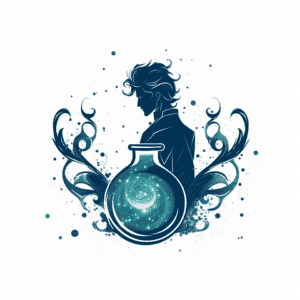Are you curious about the mystical art of alchemy? Step into a world of ancient secrets and transformative experiments. In this article, we’ll explore the question: “Is alchemy real?” Delve into the origins, key concepts, and practices of this enigmatic discipline. From the civilizations of old to modern interpretations, we’ll examine the legacy of alchemy in science and society. Get ready to unlock the mysteries and discover if alchemy is more than just a myth.
The Origins of Alchemy
You might be curious about the origins of alchemy and how it has evolved over time. Alchemy, as a practice, has its roots in ancient civilizations such as Egypt, Mesopotamia, and China. These early cultures were fascinated by the transformation of materials and the search for immortality. Alchemy was seen as a way to unlock the secrets of the universe and achieve spiritual enlightenment.
In Egypt, alchemy emerged around 3000 BCE and was closely linked to their religious beliefs. The Egyptians believed that by manipulating and purifying metals, they could attain a higher state of being. They also sought to create elixirs that would grant eternal life. This early form of alchemy laid the foundation for the later development of the practice.
Alchemy reached its peak during the Islamic Golden Age, from the 8th to the 14th centuries. Islamic scholars translated and expanded upon the works of ancient alchemists, bringing their knowledge to Europe. Alchemists during this period focused on the transmutation of base metals into gold and the search for the Philosopher’s Stone, a mythical substance believed to grant immortality.
Over time, alchemy began to shift towards a more scientific approach in the 17th century. It became known as the precursor to modern chemistry, as alchemists started to emphasize observation, experimentation, and the use of laboratory equipment. The practice of alchemy gradually faded away with the rise of the scientific method, but its influence can still be seen in the development of modern chemistry.
Understanding the origins of alchemy is essential to grasp its historical significance and how it laid the groundwork for modern scientific practices. By studying the evolution of alchemy, we can appreciate the contributions it made to our understanding of the natural world.
Key Alchemical Concepts and Practices
Understanding the key concepts and practices of alchemy can provide insight into its historical significance and cultural impact. Alchemy, an ancient philosophical and protoscientific tradition, is rooted in the belief that by transforming base metals into noble ones, one could achieve spiritual enlightenment and eternal life. Here are some key concepts and practices associated with alchemy:
- **Transmutation:** Alchemists believed in the possibility of transforming one substance into another, particularly the pursuit of turning base metals such as lead into noble metals like gold. This process, known as transmutation, was seen as a metaphor for the alchemist’s own spiritual transformation.
- **Philosopher’s Stone:** The philosopher’s stone was considered the ultimate goal of alchemy. It was believed to possess the power to transmute base metals into gold, as well as provide the elixir of life, granting immortality. The search for the philosopher’s stone was a central focus of many alchemists.
- **Symbolism:** Alchemical texts and practices were often steeped in symbolism. The use of symbols, such as the sun, moon, and various geometric shapes, represented different elements and stages of transformation. These symbols were used to convey hidden knowledge and guide the alchemist’s journey.
- **Laboratory Work:** Alchemists engaged in practical laboratory work, conducting experiments and refining techniques to achieve their goals. This involved processes such as distillation, sublimation, and calcination, aimed at purifying substances and unlocking their hidden properties.

Alchemy in Ancient Civilizations
In ancient civilizations, alchemical practices were deeply rooted in the belief that the transformation of metals held the key to obtaining spiritual enlightenment and eternal life. Alchemy was not only a pursuit of material wealth, but also a spiritual journey towards higher knowledge and understanding. Ancient civilizations such as Egypt, Greece, and China each had their own unique approach to alchemy, but they shared a common goal of unlocking the secrets of the universe.
| Civilization | Alchemical Practices | Beliefs |
|---|---|---|
| Egypt | The Egyptians believed in the transmutation of base metals into gold, known as the Philosopher’s Stone. They also saw alchemy as a means to achieve immortality and communicate with the gods. | The process of alchemy was seen as a way to align oneself with the divine and achieve spiritual enlightenment. |
| Greece | Greek alchemists focused on the purification of the soul and the search for the “Elixir of Life.” They believed that the transformation of metals was a metaphor for the transformation of the self. | Alchemy was seen as a path to personal growth and self-improvement, with the ultimate goal of achieving immortality. |
| China | Chinese alchemy emphasized the balance of Yin and Yang energies and the harmony of the five elements. They sought to achieve physical and spiritual immortality through the use of various elixirs and potions. | Alchemy was seen as a way to attain longevity and spiritual enlightenment, with a focus on the interconnectedness of all things. |
While the ancient alchemical practices may seem mystical to us today, they were deeply rooted in the belief systems and cultural contexts of the time. Alchemy served as a bridge between the physical and spiritual realms, with the aim of unlocking the secrets of the universe and achieving a higher state of existence. Although the alchemical practices of ancient civilizations did not lead to the literal transformation of metals or the attainment of eternal life, they played a significant role in the development of scientific inquiry and the exploration of metaphysical concepts.
Famous Alchemists Throughout History
Throughout history, famous alchemists have made groundbreaking discoveries and advancements in the pursuit of spiritual enlightenment and the transformation of materials. These individuals dedicated their lives to unraveling the mysteries of the universe and exploring the possibilities of transmutation. Here are some notable figures who left an indelible mark on the world of alchemy:
- **Paracelsus**: This Swiss physician and alchemist revolutionized the field by introducing the concept of chemical medicine. He believed that the human body could be healed through the use of natural substances and minerals, paving the way for modern pharmacology.
- **Johann Joachim Becher**: Known for his work on the phlogiston theory, Becher proposed that all substances were composed of three essential elements: earth, water, and air. His ideas laid the foundation for the study of chemical elements and the development of the periodic table.
- **Hennig Brand**: In his quest for the philosopher’s stone, Brand accidentally discovered phosphorus while boiling urine. This groundbreaking discovery not only contributed to the understanding of elements but also had practical applications in the fields of medicine and agriculture.
- **Maria the Jewess**: Considered one of the first female alchemists, Maria the Jewess made significant contributions to alchemical knowledge. She developed various apparatus and techniques, including the water bath and the double boiler, which are still used in laboratories today.
These famous alchemists paved the way for scientific advancements and contributed to our understanding of the natural world. While some of their practices may seem unconventional by modern standards, their dedication and curiosity have shaped the history of science.
Modern Interpretations and Criticisms of Alchemy
You may find it interesting to explore modern interpretations and criticisms surrounding the practice of alchemy. In recent times, there has been a resurgence of interest in alchemy, albeit with a different perspective than in the past. While some people still believe in the possibility of transmuting base metals into gold or achieving immortality through alchemical means, many others view alchemy as a metaphorical practice rather than a literal one.
One modern interpretation of alchemy is that it represents a spiritual or psychological journey of self-transformation. In this view, the alchemical processes and symbols are seen as metaphors for personal growth and inner alchemy. The goal is not to physically transform substances, but rather to transform oneself, achieving a higher state of consciousness or enlightenment.
Critics of alchemy argue that it is a pseudoscience and lacks any empirical evidence to support its claims. They point out that alchemical experiments often relied on flawed methodologies and lacked rigorous scientific validation. Furthermore, modern chemistry and physics have provided alternative explanations for the chemical reactions and phenomena that alchemists sought to understand.
Another criticism of alchemy is its association with mysticism and esotericism. Some argue that alchemy’s emphasis on secrecy and symbolism contributes to its exclusion from mainstream scientific discourse. They argue that the obscure language and mystical rituals associated with alchemy hindered its progress as a legitimate scientific discipline.
The Legacy of Alchemy in Science and Society
If you look closely, you’ll see that the legacy of alchemy can still be found in various scientific and societal aspects today. While alchemy itself may not be considered a valid scientific practice anymore, its influence can still be seen in the following ways:
- **Chemistry**: Alchemy played a significant role in the development of modern chemistry. Many alchemical experiments and techniques laid the foundation for the scientific study of matter and its transformations. Concepts such as transmutation, distillation, and the search for the philosopher’s stone can be traced back to alchemical practices.
- **Symbolism**: Alchemy was filled with symbolism and metaphors, often represented through intricate diagrams and images. These symbols continue to influence various fields, including psychology, literature, and art. For example, Carl Jung, a famous psychologist, incorporated alchemical symbolism into his theories on the human psyche.
- **Herbal Medicine**: Alchemists were known for their extensive knowledge of medicinal plants and herbal remedies. Today, this knowledge still influences the practice of herbal medicine and natural healing methods. Many traditional remedies and botanical preparations can be traced back to alchemical practices.
- **Philosophical Concepts**: Alchemy was not just about physical transformations but also about spiritual and philosophical ones. Ideas of transformation, purification, and the pursuit of perfection can still be found in various philosophical and spiritual traditions today.
While alchemy may not have achieved its ultimate goal of transmuting base metals into gold, its legacy lives on in the scientific and societal realms. Its influence on chemistry, symbolism, herbal medicine, and philosophy continues to shape our understanding of the world around us.

Frequently Asked Questions
Can Alchemy Be Used to Turn Lead Into Gold?
Alchemy is a historical practice that has intrigued many throughout the ages. One question often asked is whether alchemy can be used to turn lead into gold. This idea, known as transmutation, has been a central focus in alchemical pursuits. While alchemists believed in the possibility of such transformations, modern science has shown that it is not scientifically feasible. The process would require altering the atomic structure of lead, which is beyond the capabilities of alchemy or any known scientific method.
What Were Some Common Ingredients Used in Alchemical Experiments?
In alchemical experiments, common ingredients were used to create various transformations. These ingredients included metals such as lead, mercury, and gold, as well as minerals like sulfur and salt. Other substances like plants, animal parts, and even celestial bodies were also believed to hold power in alchemy. These ingredients were combined and subjected to various processes and reactions in the hopes of achieving transmutation or the creation of the philosopher’s stone.
Did Alchemists Believe in Magic or Supernatural Powers?
Did alchemists believe in magic or supernatural powers? Alchemists were deeply influenced by the beliefs and practices of their time, which often involved a belief in magic and the supernatural. They believed that through their experiments and rituals, they could tap into mystical forces and harness them for their work. These beliefs played a significant role in shaping the goals and methods of alchemy, as alchemists sought to uncover the secrets of nature and unlock the hidden powers of the universe.
Were There Any Successful Alchemical Transmutations in History?
Throughout history, many curious minds have wondered about the possibility of successful alchemical transmutations. They have sought answers to whether elements could be transformed into gold or if the elixir of life could be created. These inquiries have captivated the imaginations of both scientists and philosophers. The allure of alchemy lies in its promise of unlocking the secrets of nature’s transformations. Whether or not these transmutations have been achieved, the quest for knowledge and understanding continues to drive human curiosity.
How Did Alchemy Influence the Development of Modern Chemistry?
Alchemy, regardless of its reality, had a significant influence on the development of modern chemistry. It laid the foundation for experimental methods and laboratory practices. Alchemists conducted countless experiments, exploring the properties and reactions of various substances. Their pursuit of transmutation led to the discovery of new elements and compounds. Although alchemy was eventually discredited, its emphasis on observation and experimentation paved the way for the scientific approach that is fundamental in modern chemistry.
Conclusion
In the realm of alchemy, a mystical and enigmatic world unfolds, captivating the imagination and stirring the soul. Though the scientific validity of alchemy may be questioned, its legacy endures as a testament to the indomitable human spirit and our ceaseless quest for knowledge and transformation. Like the elusive philosopher’s stone, alchemy continues to inspire and intrigue, reminding us of our boundless potential to unlock the secrets of the universe and alchemize our own existence.

